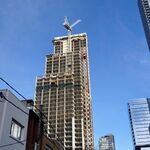Press Release on the Condo Market
NEWS RELEASE
Contact: David Eisenstadt/Beth Merrick
The Communications Group Inc.
416.696.9900 ext. 36 or ext. 40
deisenstadt@tcgpr.com/bmerrick@tcgpr.com
DOWN FROM THE RECORD BREAKING 2007,
THE TORONTO CMA CONDOMINIUM MARKET CONTRACTED IN 2008, ACCORDING TO
URBANATION’S Q4/08 CONDO REPORT
TORONTO, Feb. 4/09…According to Urbanation, the latest figures for the Toronto Census Metropolitan Area (CMA) show 14,469 new condominium apartment sales for 2008. Compared to 2007’s record of 22,654 new condominium sales, this is a decrease of 36 per cent; however, 2008 represents the 4th highest annual sales total in Toronto’s history.
Said Jane Renwick, Urbanation Executive Vice President and Editor, “the U.S. economy’s housing market problems sparked the global financial and economic downturn, which began to affect Toronto condo buyers in the Fourth Quarter of 2008â€.
The economic downturn resulted in a decline in consumer confidence and Q4-2008 sales fell to just 2,082 as a result, less than half of the Q4-2007 total. However, the 16 new projects launched in the quarter performed well, selling an average of 84 units per project.
Despite the slowdown, the average price per square foot (psf) increased 1.9 per cent from Q3-2008 to Q4-2008, from $406 psf to $414 psf in the Toronto CMA.
Ms. Renwick added, “purchasing a new unit in 2009 will be advantageous for first time buyers with interest rates being historically low and developers offering aggressive incentive programsâ€.
The CMA condominium resale market has been similarly challenged by the new economic climate. Of the over 170,000 condominium apartments tracked by Urbanation, 12,718 resold in 2008. This was 19 per cent below the 15,652 resales in 2007, and marks the first resale market decline in the CMA since 1995.
The major drop in 2008 resales occurred in the final quarter of 2008, as the chill from the global downturn finally took hold. Only 2,081 units were resold in Q4-2008, a 44 per cent decrease from Q4-2007’s 3,696 resale units.
Resale pricing also dropped modestly, as resale buyers became more difficult for sellers to attract. The average resale price per square foot (psf) dropped 4.1 per cent from Q3-2008 to Q4-2008, from $328 psf to $314 psf. This translates into an average selling price of $283,000 for a 900 sf unit.
Government stimulation of the Canadian economy will take some time to work its way from Ottawa to the streets of Toronto. The positives that are still in place include the relative affordability of new and resale units, continuing migration to Toronto, and an expected decline in construction costs, as costs are bid down to deal with the new economic realities.
“Urbanation expects as many as 11,000 new condominiums to come to market in 2009, with the proviso that the actual number will be heavily dependent on sales absorptions and pricing trends during the course of the year,†said Ms. Renwick.
ABOUT URBANATION
Urbanation is Canada's leading condominium market research company. Since 1981, Urbanation has analyzed the Toronto condominium market, publishing the “industry bible†– Urbanation’s Condominium Market Survey. This quarterly Report tracks new, resale and future condominium projects. Urbanation also provides the development community with essential consulting services, which include site and topic specific market studies and surveys.




